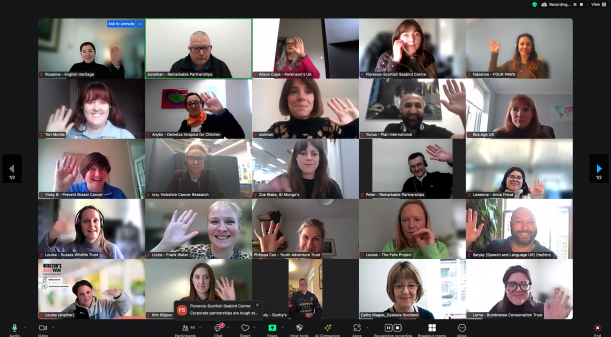How to build momentum during tough economic times

We know it can be difficult to build corporate partnerships in this challenging economic climate. That's why we held a free webinar to support charities to build momentum during tough times.
We heard from four inspiring speakers who are making progress right now:
- Louise Bingham from The Felix Project
- Rachael Ogden-Wilson from Sea-Changers
- Louise Colbran from Sussex Wildlife Centre
- Peter Chiswick from Remarkable Partnerships
They shared these 10 practical recommendations:
1. Think outside the box
Find creative ways to get your foot in the door and engage your prospects. For example, The Felix Project offers companies an intern workshop on food waste, which helps solve a problem for human resources teams struggling to find engaging activities for interns and graduates in their first week.
2. Know your value
Have confidence in the value of your charity and your brand. Create an internal matrix that outlines different partnership levels and the benefits you can deliver for each one. Then, review your levels to ensure you're not undervaluing yourself. For example, The Felix Project raised their minimum partnership value from £5,000 to £15,000.
3. Have the ability to say no
Louise Bingham’s first manager offered invaluable advice: “When is a gift not a gift? When it takes more than it gives!” Know when to say no and avoid wasting time on partnerships that drain your resources.
4. Create excitement
The Sea-Changers team meets weekly to brainstorm shared purpose and tailored activities for their prospects. This creative energy motivates them to engage with and follow up on leads. As Rachael puts it, “How can I get a company excited if I’m not excited in the first place?”
5. Focus and persist
Sea-Changers have increased their focus by identifying their top 10 prospects and putting them into a pipeline. They’re persistent because they know that building corporate partnerships requires playing the long game.
6. Engage with the cause
As a grant-giving charity, Sea-Changers have found it challenging to engage companies with the cause. To address this, they organised an online Project Showcase featuring four initiatives they've supported. Inviting corporate partners and prospects to this event was a powerful way to engage them emotionally.
7. Go back to your roots
Sussex Wildlife Centre developed a new strategy and is using it to engage companies. By sharing their strategy and discussing how it aligns with corporate partners’ values and goals, they identify common goals that can serve as the foundation for a meaningful partnership.
8. It’s not just about the money
Louise from Sussex Wildlife Centre has emphasized to her senior leadership team and trustees that corporate partnerships should be strategic and not solely about financial support. Companies can add value in many ways, for example, companies are helping Sussex Wildlife Centre with PR and IT support, and even providing an electric vehicle!
9. Don’t forget about your current partners
Sussex Wildlife Centre is reconnecting with current partners to understand what they want from the partnership. They're also hosting events where partners can collaborate, share ideas, and work together to move the charity forward.
10. Identify the company’s pain points
Understand your corporate prospect’s challenges. When you engage with them, uncover their pain points and position your charity as a solution provider. How can you help them with employee retention? How can you make them stand out from competitors? How can you help them meet their ESG goals? When you’re helping solve their pain you’re increasing your chances of success, because you are relevant to them and you’re a priority.
We hope these recommendations help you build momentum. Is there one you can use with your partners and prospects? Remember, success comes from taking many small steps in the right direction. You can take that first step today.
--
You can also:
- Check out our training courses: https://www.remarkablepartnerships.com/training/
- Connect with us on LinkedIn: Jonathan Andrews, Georgina Oxlade and Peter Chiswick
- Join our mailing list for inspiration, insights and practical advice: https://www.remarkablepartnerships.com/newsletter-sign-up/




